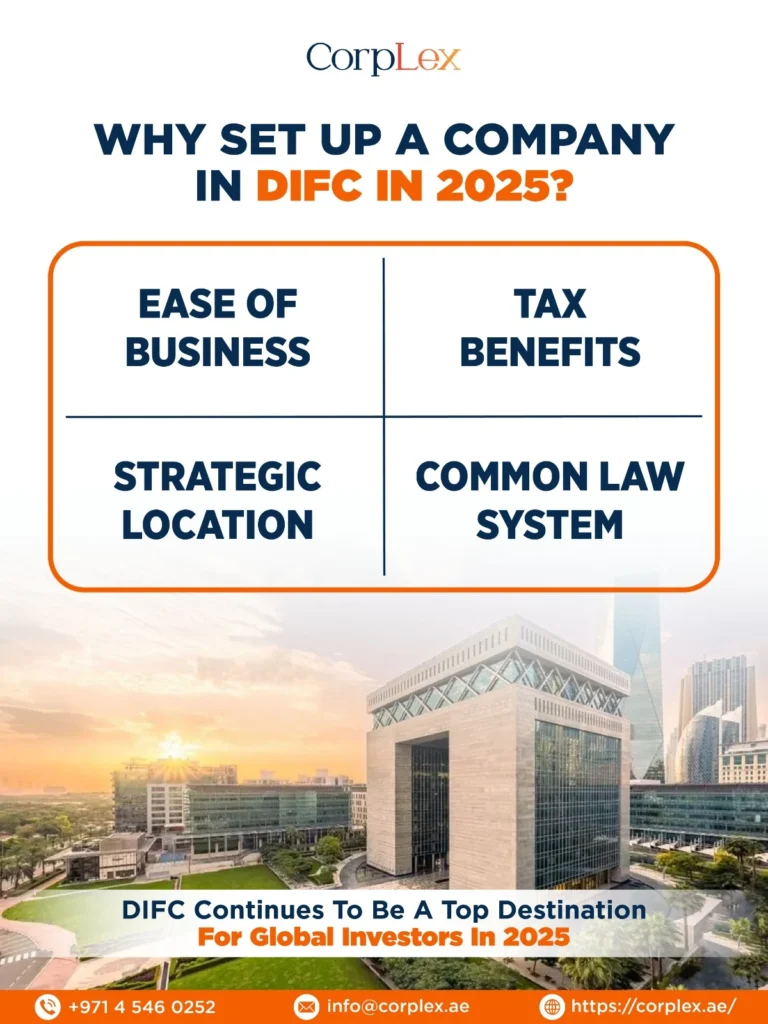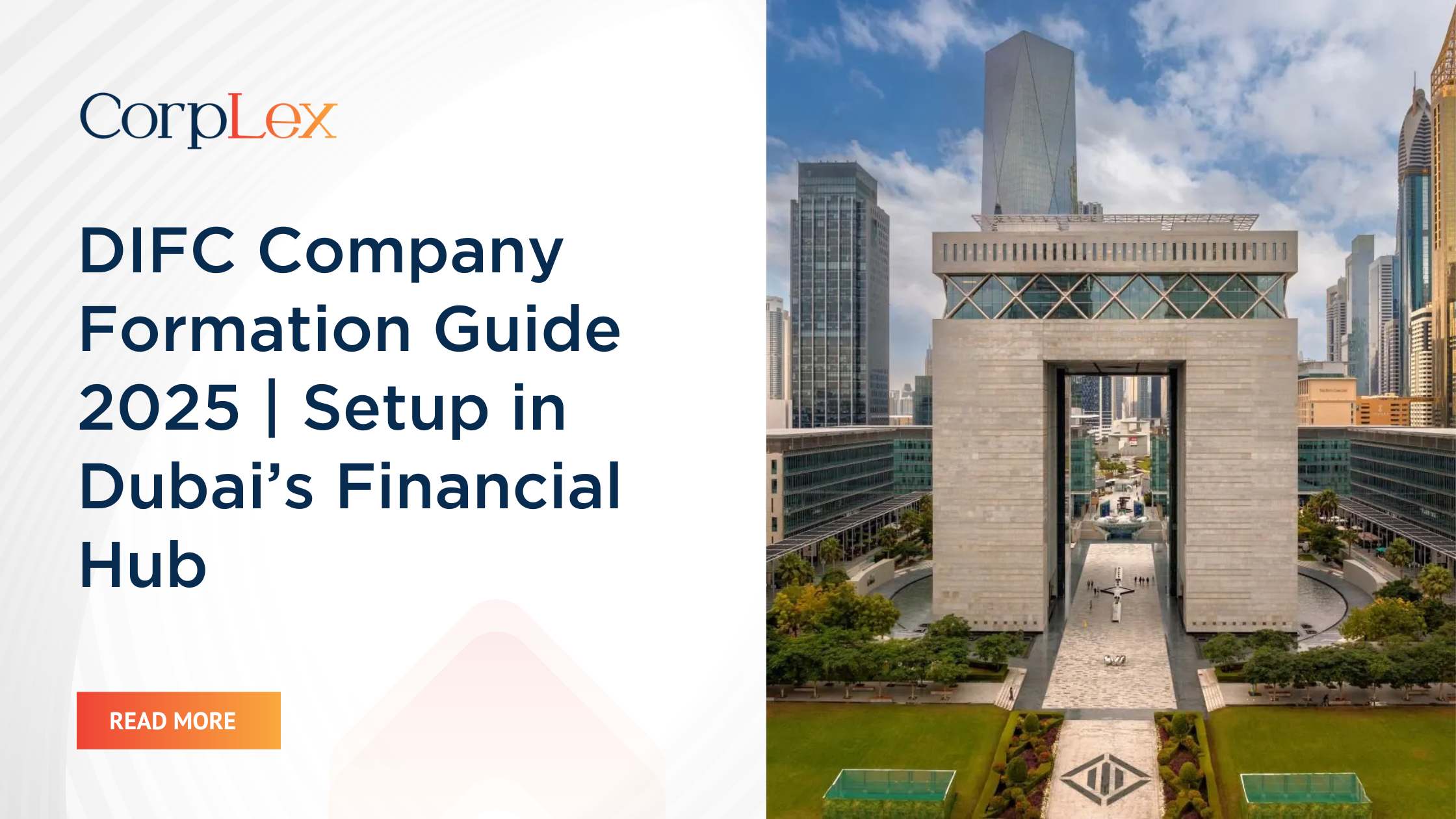What is DIFC?
“Dubai International Financial Center”, a financial free zone that has stood out during the past twenty years and is currently paving the way for an inimitable future of finance through technology, innovation, and partnerships.
DIFC is a freezone established by the Government of Dubai back in the year 2004. It acts through the DIFC courts’ authorities and is considered a preeminent international financial freezone located in the heart of Dubai, UAE. This entity has also been leading world financial operations throughout the years and proving its competency.
DIFC: A Magnet for Foreign Investments:
What started as an establishment to facilitate trade and investment, has now become a leading international financial hub, covering seventy-seven countries within the MEASA area and having a gross domestic product of ten point five trillion dollars. DIFC is considered one of the largest freezones in Dubai.

Key benefits of DIFC company formation include:
- Applies a common law system, completely in English and independent from the UAE’s civil law.
- Offers low income and corporate tax for fifty years for certain entities.
- Provides the ease of doing business through relatively fast company registration processes.
- Resides within a strategic geographic location which bridges Europe, Asia, and Africa.
These advantages make company formation in DIFC a magnet for foreigner’s investments in 2025.
Legal formation Choices:
An individual has a wide range of formation options, depending on the scope of activities to be provided, DFSA (Dubai Financial Services Authority) regulates financial services offered within DIFC (such as banks, financial firms…), whereas the DIFC Authority, manages company registration and administration for non-financial business professionals, as well as making sure of their compliance with DIFC’s regulatory requirements.
- The most common forms for DIFC company formation are:A Private Company (Ltd), that has a limited liability, having a minimum of one shareholder and director, but not exceeding fifty (article 27.1 of the DIFC companies’ law of 2018).
- A Public Company with limited liability as abiding to article 27.4 of the previously mentioned law stating that the company holds a minimum capital share of one hundred thousand US dollars (art.35.3), public companies are known as PLCs and have the capacity of offering their securities to the public.
One can also start up a:
- Limited Liability Partnership (LLP), an entity mostly used by professional service providers.
- A Branch of a Foreign Company, the latter doesn’t establish a new legal entity and should always mirror the parent Company and function accordingly.
- Special Purpose Company (SPC), a holding company mostly used for investment structures.
- Foundation, which is a legal entity separate from the founder’s legal personality and is mostly used in succession planning and private wealth management. (Foundations law No.3 of 2018)
Want to explore legacy planning and wealth structuring within DIFC? Check out our detailed guide on DIFC Foundations
The previously mentioned establishments have the requirements of either being registered with the DFSA (Dubai Financial Services Authority), if the firm offers financial services – also known as regulated businesses – operating within DIFC, such as banks, asset managers, firms conducting financial advisory…; or the DIFCA authority, which governs non-financial businesses –nonregulated businesses– and corporate services, such as Tech Companies, Retail, Wealth Holding Entities…
A Step-by-Step guide to set up a company in DIFC:
Prior to company formation in DIFC, business activity should be specified, as this is the key to identifying the licensing authority along with ongoing obligations. DIFC also has strict requirements regarding the office premises (a registered office within DIFC is mandatory), so is the compliance with AML regulations. Lex Estates can assist with finding your desired office within DIFC.
Procedure:
- Apply for initial approval through online portal registration, with the help of a DIFC registered agent or legal advisor.
- Choose the appropriate legal structure based on the business category (to figure out whether it is regulated or non-regulated) as financial services are regulated.
- Reserve your company’s name, making sure it complies with DIFC naming rules.
- Obtain DFSA approval and license (for regulated activities)
- Submit company documents (Article of Association and business plan).
- Apply for a certificate of incorporation.
- Lease an office within DIFC.
- Open a corporate bank account.
DIFC company setup offers a great deal of advantages, from having access to a world-class financial ecosystem, to the decent global reputation, and the privilege of having investor confidence.
Time frame for company setups in DIFC:
- Non-regulated activities as in non-financial designated business professions: usually need six to eight weeks.
- Regulated activities as in financial service providers: it can take up to six months, or even more in certain cases.
Note that any incorrect details in applications may cause extra delays, in addition to the complexity of the business activity, and DFSA approvals.
- Cost of company set up in 2025
DIFC offers a strategic premium location, in the heart of Dubai for business set ups, advantages for financial companies, but this comes with a premium price tag.
Company set up in DIFC in 2025 involves various costs, including registration, licensing, and visa fees. All of which sum up the amount of eight thousand dollars (around 29,000 AED), and could reach up to fifty thousand US dollars, even more, depending on the company type, business activity, and number of visas to be issued. Office rent is separate and usually varies between USD 150 – 200 per sqft space. There are also serviced desk or offices available from DIFC registered business centres.
Compliance requirements post set up:
After setting up a company in DIFC, there are several mandatory post-incorporation compliance requirements the entity should follow to remain in good legal standing.
The key requirements can be listed as follows:
- Annual Registrar of Companies: this report is due before the first anniversary of the company’s incorporation, it includes shareholder details, director information, and share capital information.
- Audit and accounting requirements: Companies are to prepare financial statements within six months of the financial year end; the latter should be audited by a DIFC-registered auditor unless exempt.
- Data Protection Registration: it is mandatory for companies to register with the DIFC Data Protection Commissioner under Law No.5 of 2020.
- Ultimate Beneficial Owner declaration: Companies must declare and maintain up to date records of their UBOs.
- AML/CFT compliance (for regulated entities): Entities holding a regulated license should appoint a MLRO (Money Laundering Reporting Officer), implement a strong AML policy, report to DFSA, and ensure compliance with UAE’s wide AML requirements, including the goAML portal registration and STR reports to the Financial Intelligence Unit.
Common Pitfalls to Avoid:
- Overlooking license specifications: In DIFC, each business has its corresponding specifications. When it comes to the licensing authority, we need to make sure the business activity has the proper license to perform.
- Keeping unregulated archive of audit records: Accurate company records including director, shareholders, and statutory registrations. All of which must be updated and kept in check for yearly checks by the DIFC authorities.
- Using UAE’s Employment Law: DIFC has its own employment law, where terms and conditions for labor are different than that of the UAE’s, especially concerning the salaries (minimum wage), and end-of-service benefits, to avoid disputes.
- Dismissal of AML compliance regulations: during the past recent years, money laundering has been evolving and posing great threats on business operations globally, one of the most basic penalties include the blockage of bank accounts, even closing them, or asset freezing, in addition to imposing substantial fines in cases of poor AML applications. The UAE has recently implemented strict rules regarding AML compliance, updating the rules regularly, the latest law being the one issued on 8th of June 2025, including sanctions for both financial and non-financial designated business professionals. The AML compliance law is now imposing substantial fines on breaches and impairments in the application of this law.
Final Thoughts
To sum up, DIFC companies enjoy privileges of tax efficiency, an independent legal and regulatory framework, a business-friendly environment, in addition to the strategic location, and innovative infrastructure. It has become a point of attraction for businesses from around the world.
Get in touch with our team of experts to learn how we can support your DIFC company formation with confidence and clarity.
Exploring financial free zones in the UAE? Alongside DIFC, the Abu Dhabi Global Market (ADGM) is another leading international financial center offering a robust legal framework, strategic location, and attractive incentives for businesses. Discover how ADGM company setup can complement your UAE expansion plans. Learn more about ADGM setup here.

